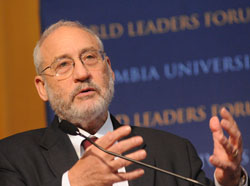
Stiglitz’s view of the economy and how to fix it
COMMENTARY | May 124, 2011
The Nobel laureate rejects GOP austerity proposals, offers wideranging plans to reduce the deficit, put people back to work, and halt growing economic inequality. Step No. 1 would be to increase revenues.
By John Hanrahan
hanrahan@niemanwatchog.org
Nobel laureate economist Joseph Stiglitz wants Americans not to be diverted by much of the rhetoric in the political debate over deficits and the calls for harsh austerity from Republican members of Congress and some GOP governors.
In contrast to the austerity hawks' proposals, Columbia University professor Stiglitz says, "There are principled ways of cutting the deficit" and reducing the nation's overall debt while at the same time “putting Americans back to work,” making life better for the millions of Americans in precarious economic circumstances, and halting growing economic inequality where one percent of the population controls 40 percent of the wealth and takes one-fourth of the nation’s income every year.
In a recent address to an AFL-CIO conclave on creating more equitable and sustainable growth in the U.S. economy, and in a follow-up interview with Nieman Watchdog, Sitiglitz said the most important thing in dealing with deficits and sparking a true economic recovery "is to increase revenues.”
“The deficit didn’t cause the downturn,” he said, “the downturn caused the deficit."
Primary factors in that downturn, he said, were President George W. Bush's tax cuts, "health care costs out of control," and "unbridled military expenditures," including the immense costs of the nation's two-plus wars in Iraq and Afghanistan/Pakistan.
Stiglitz emphasized to the AFL-CIO audience that the nation cannot have a true recovery when one in six American workers are either unemployed, underemployed, or have given up and dropped out of the job market altogether. Even those figures mask some harsher realities. As Stiglitz pointed out, the unemployment figures are much worse for African-Americans especially, as well as Latinos, in many urban areas. Then there are the chronic unemployment figures – for those unemployed for six months or more) – that are truly alarming, amounting to 40 percent of the unemployed (some 6 million individuals).
Among those "principled ways to cut the deficit," as well as stimulate the economy and put the unemployed back to work, Stiglitz called for:
• Reforming bankruptcy laws so banks can’t gouge borrowers for the rest of their lives if they file for bankruptcy. Under current law, he said, banks can dock up to 25 percent of a debtor's annual wages, and can also charge “usurious rates” – as much as 25-30 percent interest – on the outstanding balance. At this rate, he said, a borrower is trapped in a perpetual state of "indentured servitude."
• Creating a special homeowners‘ version of Chapter 11 bankruptcy. Some seven million people have lost their homes since the economic crisis hit three plus years ago – "and another 2 million could go this year," he noted.
• Restructuring mortgages. The Federal Reserve, he said, bought $1 trillion worth of troubled security-backed mortgages. "Now that we own them, why can't we restructure them?" he asked.
• Getting the banks back to basics. The problem, even after the huge bailouts to financial institutions that were engaged in highly risky activities that brought down the global economy, Sitglitz said, is that "there's a lot more money in high-stakes gambling" on questionable investments than there is in traditional banking practices. In responding to the economic crisis created by the financial sector, “we have made the big banks even bigger” and with “the understanding that we will bail them out” again in any future crisis.
Four years after the bursting of the real estate bubble, Sitglitz wrote in the preface of a just-published report of a global trade union taskforce, “the rules of the game, the regulations which government imposes on banks, have yet to be adequately changed. Incentives for excessive risk taking and short-sighted behavior remain; indeed, the problem of moral hazard posed by too-big-to-fail banks is worse, not better.”
• Reining in out-of-control health care costs that make the Medicare and Medicaid programs so expensive. "If we had health care costs comparable to those in European countries, we would have no deficits," Stiglitz said. One significant place to start: Amending federal law to allow the government to negotiate with pharmaceutical companies over drug prices under Medicare Part D, he said – just as the Veterans Administration can do for its drug purchases, which are 50 percent lower in cost than Medicare’s. Tens of billions of dollars could be saved annually in Medicare drug costs if prices could be negotiated by the government.
Regarding the much-publicized Republican austerity plan offered by Rep. Paul Ryan, Stiglitz told us: "Basically, it proposes to cut expenditures for Medicare and Medicaid, but does nothing to address rising medical costs." If adopted, this plan would result in a rationing of services or lack of access for persons now covered under both programs, leading to "a downward, vicious spiral. That's the core of the Ryan plan in the short run,” he said.
• Undertaking substantial defense budget cuts. "We could get more security for less spending," he said. "The Cold War is over, yet we spend hundreds of millions of dollars on weapons that don't work for enemies that don't exist." On top of that, he said, the wars in Iraq and Afghanistan have added $1 trillion to the nation’s debt. This war-related debt figure will increase even more in future years, Stiglitz said, what with one in every two troops returning from those wars requiring some physical or psychological medical treatment – many of them for decades to come.
A few years ago, Stiglitz and Linda Bilmes, a public policy professor at the Harvard Kennedy School, wrote a book, “The Three Trillion Dollar War,” the title a reference to what they estimated would be the ultimate cost of the Iraq and Afghanistan wars. Since then, he said, they have come to realize “we were much too conservative” in estimating the costs.
• Making sure all corporations pay their share of taxes, and requiring the nation's wealthiest 1 percent of individuals to pay more in income taxes. Even after ending the Bush tax cuts for the wealthiest Americans, Stiglitz said, those highest-income taxpayers "would still be ahead of where they were a decade ago."
• Imposing “moderate increases” in capital gains and estate taxes and establishing a “small financial transactions tax,” all of which could raise substantial revenue, he said.
• Stopping "government giveaways of natural resources" – oil, gas, minerals, forests – through well-structured auctions that would bring in “serious revenue.”
• Curtailing corporate welfare, “which makes our economy more inefficient and increases unemployment.”
• Increasing enforcement of federal antitrust laws.??Regarding the Bowles-Simpson Commission deficit reduction recommendations, Stiglitz noted that panel’s proposal to do away with the homeowners' mortgage deduction. He said, "Eventually, we must deal with the mortgage deduction, but not now." Eliminating the mortgage deduction in this troubled economy "would amount to an increased tax," hitting hardest on the already hard-hit middle-class "and would make the housing market even worse," he said.
Even before the economic crisis hit in 2007, Stiglitz said, the vast majority of Americans “year after year were getting poorer.” Household income today, on average, is lower than it was in 1997, at the same time income and wealth inequality have became even more pronounced in the United States. Yet, he said, we “told people to pretend their income was going up and to consume more.” And people did that, going into debt while at the same time believing they were getting wealthier because of the housing bubble.
In those days before the housing bubble collapsed, “We were on artificial respiration and we didn’t even know it,” Stiglitz said.
Meanwhile the rich were getting richer and inequality was widening. While nations as disparate as Brazil and China “have both recognized inequality as a major concern and are doing something about it,” United States leaders have not. Calls for “mindless deficit reduction” without adequately addressing job creation and mortgage relief will only exacerbate inequality and the nation’s economic problems, he said.
Asked what the press could do to provide a better understanding of the nation's current economic problems and various proposed austerity policies, Stiglitz suggested more human interest stories that show the link between often-dry policy proposals and their impact on actual human beings. Also, he said, so much of the press coverage focuses on what Republican and Democratic leaders are saying about economic issues, to the exclusion of other voices. He suggested that reporters turn more to academic experts for analysis and explanations of economic issues and proposed policies.
With all the news media coverage of calls for austerity in U.S. budgeting, Stiglitz said he finds it "a little surprising that the New York Times and the Washington Post haven't done articles that actually look at austerity programs” undertaken by other nations to compare them and see how they have worked out. He suggested that a news organization look at 10 such nations, and then have economists on the left and right and in-between evaluate how successful or unsuccessful these efforts have been and how the lessons of those nations’ policies apply – or don’t apply – to the United States..
The point, Stiglitz said, is that the United States shouldn't undertake a policy without seeing how that policy has actually played out in practice in other countries, and that the press can play a major role in educating the public and politicians about austerity programs. "There should be some discussion of what has happened before," he said. In his own assessment, of some 10 countries he has looked at, he said only Canada and Sweden have shown some success with their austerity policies.
In this regard, he noted a New York Times article that reported that Britain’s one-year-old austerity program had proved to be, in the article’s words, “less than promising.” The article reported that retail sales were down 3.5 percent in March – “the sharpest monthly downturn in Britain in 15 years” – and cited a research group’s forecast “that real household income will fall by 2 percent this year,” a decline reminiscent of the 1930s.
There are lessons to be learned from other countries’ experiences, he said. "So,” Stiglitz asked, “the question is, are we going to be in the 20 percent or in the 80 percent?"
|
|
John Hanrahan is a former executive director of The Fund for Investigative Journalism and reporter for The Washington Post, The Washington Star, UPI, and other news organizations. He is now on special assignment for Nieman Watchdog. 
E-mail: johnhanrahan5@gmail.com
|





